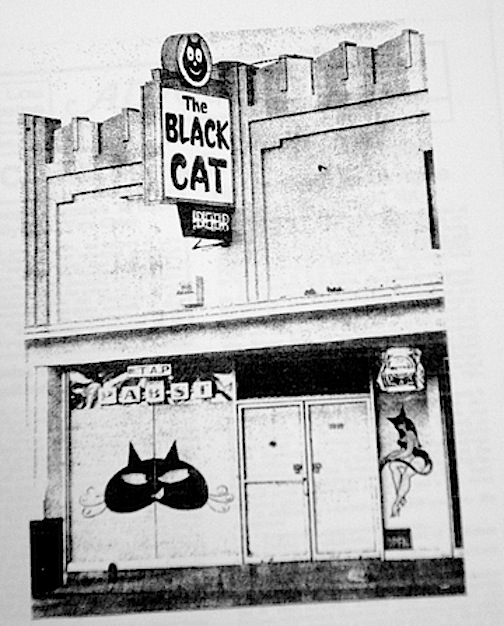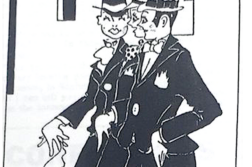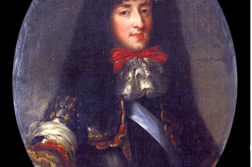VALENTINE’S DAY, 1978. The Castro District of San Francisco was buzzing with an infectious, sexy energy. Since last November, the gay community has been on a high after Harvey Milk won a seat on the San Francisco Board of Supervisors—the first openly gay man to be elected in a major U.S. city. Like so many gay people, I was downcast and pessimistic during the Nixon years. Harvey changed all that. Nevertheless, ahead of us were considerable headwinds at the state level.
I drove to the Castro District to meet my friend Steve and catch the special Valentine’s Day show at the Elephant Walk. This popular bar resembled an orange-and-white-striped circus tent and was always jam-packed with exotic night people. A pink flyer was taped on the front door: “Sylvester—One Night Only!” and “need we say more, girls?” Steve was energetically waving at me from the bar. Threading my way through the crowd, I smiled at my friend with the impish eyes and well-groomed hair, cut short but not butch. Alongside him was blond spiky-haired Orvis, his current flame. I trailed after Steve and Orvis to a table near the stage. While downing a G&T, I scanned the room for other lesbians. Single again, I thought: who knows? Maybe tonight.
After we ordered a second round, Steve grinned as three guys sat down behind us. I turned around, instantly recognizing the face. It was Harvey Milk! After Steve and Harvey gave each other a bear hug, Steve introduced me. Harvey smiled and tapped my shoulder: “Emily, please get out and vote this November. We’ll need everyone with us to stop Anita and the Briggs Initiative.”
Totally apolitical, Orvis had a perplexed look, so I filled him in: “Briggs is a gay-bashing California state legislator who’s sponsoring a ballot initiative that effectively bars us from teaching in public schools. Anita Bryant is the TV mouthpiece of Florida orange juice and the founding creep of this crusade to carve up our civil rights.”
Harvey hoisted his beer bottle over his head, declaring: “California’s going to come out!” His table companions cheered, as did everyone at the surrounding tables.
San Francisco Gay Pride was held on the last weekend of June in 1978. Unlike the previous year, it was not going to be just a naughty, fun affair. The Briggs Initiative loomed on the November ballot. Mayor Moscone and Harvey Milk led the parade with the theme, “Come Out California.” I drove up early from my home south of the City. On Market Street, rainbow flags fluttered from every light standard from Castro Street to the Civic Center. Steve and Orvis met me on Spear Street.
On the crowded streets, there was an infectious, loud energy, unlike anything I had ever witnessed for gay rights. Leading off the parade, Dykes on Bikes roared past. Behind them, guys in leather vests blew whistles and beat drums. A huge rainbow flag followed, held horizontally by over twenty people. Marchers hoisted clever homemade signs, reading: “Women love women, get over it!”; “This is brotherhood week, Briggs! Take a lesbian to lunch”; “Suck anything but orange juice!”; and “A day without human rights is like a day without sunshine.”
As the crowd roared, a gold Cadillac convertible with its top down inched forward, with two men perched on top of the back seat. Mayor Moscone pivoted and waved to the four-deep crush of spectators. I caught a glimpse of his broad smile and husky Italian face. Beside him, Harvey Milk was wearing a rainbow T-shirt, dappled with political buttons. He held a sign on his lap: “I’m from Woodmere, N.Y.” Alongside the car, supporters shoved bumper stickers to the spectators that read: “california come out!” Steve, Orvis, and I waved toward Harvey. He spotted us and motioned for us to join the contingent behind his car. We happily jogged over to squeeze in alongside government workers, dressed in a drag parody of their workday garb. I loved the queens in doctor’s white coats.
There were lots of news cameras and police. The parade proceeded down Market Street in fits and starts. All the way to the Civic Center, thousands clapped and held up clenched fists. That day, I knew we would never go back or hide in the shadows. Today was our West Coast Stonewall, not to be missed!
At the Civic Center rally, it was difficult to hear all of Harvey’s speech, given the hubbub of the crowd that overflowed onto Market Street, but I did catch these words: “We are coming out to tell the truths about gays, for I’m tired of the conspiracy of silence, so I’m going to talk about it. And I want you to talk about it. You must come out. We will not win our rights by staying quietly in our closets.”
The momentum of the parade carried us through the summer to the November election. The Briggs Initiative lost by a million votes. 75% voted against it in San Francisco. We were on top of the world!
All that came crashing down on Monday, November 27th. That morning, I called in sick to my employer. My throat was on fire. I gargled, slurped chicken soup, and suffered asleep on the couch. My dream became a persistent knock. It wasn’t a dream. Someone was at my front door. I gathered my lap blanket around my shoulders and eased open the screen door. It was Steve. One look at his face told me that something awful had happened. He put his arm around my shoulder and sat me down.
“I know you’ve been sick all day and haven’t heard the news.” He hung his head. “The Mayor and Harvey Milk were murdered at City Hall. Another Supervisor, Dan White, killed them both. Why he did it isn’t clear, but that doesn’t matter.” I dropped the blanket and rushed to turn on the TV. It couldn’t be true! My young life had unfolded in a time of assassination—Malcolm X, JFK, Martin Luther King, Robert Kennedy.
I remember the ominous silence in the streets, the helpless grief that moved some to helpless fury. The unthinkable must be happening again. A grave-faced TV announcer filled in the details. Dan White avoided the City Hall metal detectors by climbing in a basement window. He went to Mayor Moscone’s office. Witnesses heard shouts followed by gunfire. Then, White walked down to Harvey’s office and shot him five times.
This madman had killed someone whose hand I touched, someone I admired. Our gentle hero. I sobbed in Steve’s arms. “I’ve heard there’s going be a vigil in the Castro,” Steve murmured. “I want to take you. Let me be your buddy tonight.” He produced two long church candles with little foil handles. “Get dressed and wrap up good.” I nodded, even though my throat was simmering in hell. Before we left, I ran to the garden, where I cut off the last of my purple asters. I tied them together with a string, then climbed into Steve’s old Jeep. We found a parking spot off Dolores Street.
A mass outpouring of grief awaited us at Market and Castro. We threaded our way through the crowd, which grew by the minute, to a makeshift memorial topped with a rainbow flag. I lay my asters on top of a heap of flowers, pictures of Harvey and the Mayor, and handwritten notes. Steve and I held hands. Backs and shoulders in front of us heaved, voices hushed to a whisper. As the sky turned dark, thousands instinctively coalesced into a line headed toward Market Street, a spontaneous march of sorrow. The police didn’t hinder us. They stood back to let everyone go.
“To City Hall.” Word passed like a rope from hand to hand. Someone yelled: “If you don’t have a candle, raise your hand. We have lots more.” Steve reached in his pocket for ours. He even remembered to bring matches. A tall drag queen with mascara running in a jagged line down her cheek sang in a rich baritone. I knew the song well. “We shall overcome. We shall overcome some day.” The few cars on Market Street swerved aside, disappearing on side streets, horns silent. More marchers joined, some carrying signs they had improvised at home. At nightfall, the crowd filled the Civic Center plaza behind City Hall, and more kept coming. Our candles softened the darkness and the bare silhouettes of trees. Steve and I wedged near a street pole. Steve took my hand, holding it lightly in his.
Joan Baez climbed the granite steps of City Hall to a makeshift microphone. She pulled her guitar across her chest. Her familiar face, framed with long black hair, was somber. She leaned into the mike and said softly: “I dedicate this song to Mayor Moscone and my friend Harvey Milk.” She chose “Amazing Grace” to sing. I hummed the wistful melody as all of us swayed side to side. That night, it became our anthem—about what we had gone through in our lives, what we did together, and what we still needed to do. The lyrics that struck me were: “It was grace that taught my heart to fear,/ And grace my fears relieved;/ How precious did that grace appear.”
Harvey Milk graced our lives, so we would never be cowed and silenced again.





